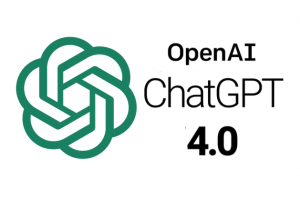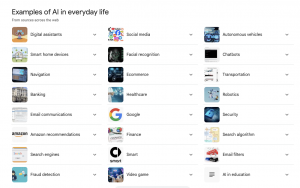Think of ChatGPT as a friend

As interested as I am in Artificial Intelligence (AI), and as pervasive as it is becoming in our daily lives, I seem to only manage one blog post per year about it. Suffice it to say that a lot can, and does, happen in a year! So, consider this your annual update.
Progress!
Click image to read “An Interview with ChatGPT” (2023)
For example, some of you will remember what ChatGPT had to say, in my post, An “Interview” with ChatGPT (April 2023), under “Reality Check”, about the books I have written. It named three books with entirely plausible-sounding but utterly fabricated titles. Not only had I not written them, but no one else had either!
At that time ChatGPT had no direct access to the internet and its knowledge cutoff date was September 2021. This time, however, it gave me the correct titles of my three books PLUS clickable links to their pages on Amazon and Goodreads!
Why am I writing about AI?I’m no AI expert. My goal in writing about it is not to convince you to use it. I just want to demystify it a bit and let you know how I’ve been using it. One of my organizing colleagues, Jamie Steele, a productivity coach at Tidy Your Time, LLC, refers to ChatGPT as “Chatty G” which I think is adorable. It also dovetails with a thought I’ve had that might help you, too, when you are using it: Think of ChatGPT as a friend. (Keep reading to see why.)
Contents:AI affects us allThink of ChatGPT as a friendSome of the ways I’ve used ChatGPT latelyPersonal MemoriesGenealogyMosquitoesWritingMedicalVoice ModeCAUTION: Things to watch out forSynopses, Sources, and HallucinationsEnergy consumptionPrivacyAI affects us all
Examples of AI in Everyday Life. I know you can’t read this. Click the image to see the search results and links to more info.
AI is kind of like politics: It affects your life whether or not you are interested or pay attention to it. Here are some Examples of AI in Everyday Life (Click the link or the image to see the larger, clickable search results)
In The AI Gold Rush (May 2024) I mentioned that there were now thousands of new AI applications. They mainly fall into the two following categories:
Predictive AI such as Google and Netflix searchesGenerative AI such as chatbots, image creation, research and writing toolsIt’s more complicated than that, of course, but notice that chatbots (like ChatGPT) are not the same as search engines. They are Large Language Models (LLMs) with increasing access to the internet, but they do not replace search engines. If you want to know something factual, especially if it happened yesterday, it’s best to Google it. There are many different chatbots available, as discussed in this representative article: The best AI chatbots in 2025 (Miguel Rebelo for Zapier, March 4, 2025)

Click image to read “The AI Gold Rush” (2024)
If you aren’t sure which one to pick, there’s no reason not to try them all. Most offer a free version and a paid version with extra features. Some allow a certain amount of usage per day and that provides a built-in opportunity to try another one (if you really have that many questions or uses for it). You can even install Chrome’s Multi AI Sidebar to make it easy.
For purposes of this blog post, though, I’m sticking with free ChatGPT 4o. I think my head might explode if I branch out much further!
Think of ChatGPT as a friendWhat do I mean by that? Well, I take everything Chatty G says with a grain of salt, just like I would if I were discussing a problem with a friend. Friends are (often) not doctors or lawyers or historians. Friends can make mistakes. But that doesn’t mean it’s worthless to ask a friend for advice or run something by them. Some friends are more knowledgeable than others, and sometimes they confirm things you already think, or steer you away from faulty thinking, and add some insight you’ve never considered. They can help you organize your thoughts, or your data.
I have heard that some people use chatbots as therapists of sorts. I mean, Chatty G is not a licensed healthcare professional, but it’s a good sounding board. If it’s not a life-or-death issue, why not run it by Chatty G? It might even advise you to seek the help of a therapist!
Some of the ways I’ve used ChatGPT lately:Personal Memories
No amount of Googling was helping me find the name of the festival I used to play in each year as a piano student in 1970s Boise, Idaho. It didn’t really help that I was calling it a “competition” because it wasn’t, really. There were judges and ratings, but there were as many high (or low) ratings as there were students who deserved them. One of my memories was that I earned six Superiors in consecutive years and was therefore awarded two “Gold Superiors” (one for each set of three years). Well, they’re apparently called “Gold Cups” these days (trophies instead of certificates), and after I provided a few more details ChatGPT figured it out. (I was going to share the entire chat, but the link isn’t “sticking” for some reason. Contact me if you are curious about how the conversation unfolded, and what the festival was like.)
GenealogyAI is used for all sorts of genealogy tasks, like record transcription, image enhancement, and language translation. All of the big platforms like Ancestry, FamilySearch, and MyHeritage are constantly leapfrogging each other in terms of tools and capabilities. I’m still following the Facebook group called “Genealogy and Artificial Intelligence (AI)” where even the genealogy experts are still experimenting and sharing both their successes and their failures. Most of them have either developed, or will soon, their own instructional videos, blog posts, and classes related to AI usage.
I used Stephen Little’s prompt (“Fun Prompt Friday!” posted on Feb 28, 2025) to create a “Parke County, Indiana Locality Guide”. Having gathered most of the sources myself over the years I can report that it did a pretty good job!
I also fed ChatGPT a family history I once wrote to see what it might notice about it. I asked questions like this:
Are there any conclusions you can make that are not already stated in the article?Do you have any suggested resources for further research into the lives of these families?I can’t say I’ve broken my brick wall on that branch of my family yet, but ChatGPT did give me some historical context and other things to think about and try!
In An “Interview” with ChatGPT (April 2023), under “Should we fear AI?”, I wrote about AI-generated images. Take a look at this video to learn more about how AI can affect our use of historical photos: Fact or Fiction? Comparing Photo Tools with ChatGPT. (I will admit to only having watched the first 6-1/2 minutes of it. So you have my permission to stop at that point, too.)
MosquitoesChances are that mosquitoes are more of an issue for me than they are for you. For one thing, my blood type is O negative, which has been shown to attract more mosquitoes than other blood types. Second, we have a new stealth breed of mosquitoes here in New Mexico — tiny, silent, goes for the ankles, invades homes (well, my home, anyway). Third, I have lymphedema, and scratching mosquito bites can quickly lead to infection.
I had quite the chat with Chatty G about mosquitoes, remedies, and prevention methods. (Not sure why the link doesn’t “stick”, so contact me if you’d like to see the chat in its entirety. I may even write a whole new blog post about mosquitoes next.)
WritingI have yet to really use AI for writing. But I know a lot of writers with questions about AI. I never even used grammar- or spell-checkers until they became default features of word processing programs such as Co-Pilot for Word. I have, however, like most writers who have ever lived, used a human editor, a thesaurus, and other such writing tools. I also Google words to make sure they mean what I think they mean, and topics to learn more about them.
But I do want to share that there are uses for AI that won’t get your term paper sniffed out by AI detectors or your book rejected by Kindle Direct Publishing (KDP). The KDP link describes the difference between material that is AI-generated (requires disclosure) and AI-assisted (does not require disclosure).
Surprisingly, I found this post by Open AI, the creator of ChatGPT — Writing with AI: Five ways professional writers are leveraging ChatGPT — to be more helpful than self-serving. Among other things, it says, “Writers are using ChatGPT as a sounding board, story consultant, research assistant, and editor—to talk out ideas, find the right word, clarify their thinking, and get feedback on structure and flow.” Another good one along these lines is this: Does Using Grammarly Make My Content get Detected as AI-Generated? The Results Are In (Jonathan Gillham for Originality.ai, October 24, 2024) Spoiler alert: It depends.
One thing to watch for in reading articles these days is whole chunks of text, or distinctive phrases, that are repeated. Bad editing? Or AI? Sometimes it’s both.
MedicalIn my experience doctors often fail to sufficiently warn patients of drug interactions and ways to make them more or less effective. Or, even if they do, it’s easy for a patient (OK, for me) to forget. And, if it’s a medication you’ve taken for years, you may not think to ask a pharmacist about it and may still not know (or have forgotten) it needs to be taken on an empty stomach, or that you should avoid dairy, or citrus, or sunlight, or whatever, while you are taking it. Google has a lot of helpful info on drugs but sometimes it’s hard to assemble it all in a meaningful manner.
I had a couple of new medications that I wanted to ask ChatGPT about. I think I’ll keep this chat to myself, but the bottom line was that I did change my medication schedule as a result, but not precisely the way ChatGPT outlined it for me.
Voice ModeThe other day I was trying to work with Ziggy, my cat, in my arms. So I clicked the microphone on, thinking it was a dictation feature like I have in Word. I was expecting to see my spoken words typed out, and for Chatty G to type an answer in return. But no. Instead, I was offered several different Chat personas, with assigned names and unique voices. I chose one and asked “her” something about Social Security (without mentioning my actual SSN, of course). I noticed that chat got auto-labeled “Email clarification request” (which is not wrong, but which wasn’t helpful in searching for it later, whereupon I edited the chat name to something more meaningful). I noticed there were two voice-looking modes and asked her:
Q: “What is the difference between dictation and voice mode?”
A: “Dictation mode is usually for converting spoken words into text, like when you’re using speech-to-text. Voice mode, on the other hand, involves interacting with a device or software through spoken commands, like having a conversation.”
OK, got it! No wonder people like chatting with Chatty G!
The lesson here is that anything you want to know about ChatGPT, you might as well ask ChatGPT about directly, like I did in An “Interview” with ChatGPT (April 2023)
CAUTION: Things to watch out forSynopses, Sources, and Hallucinations
As far as AI has advanced in the generative arena, one must still exercise caution. For example, the AI-generated synopsis you can now often find at the top of many Google search results can be very handy. And it can be wrong. Worse, it can be so mostly-right that you might miss a crucial detail that is false.
If, during your private tête-à-tête, Chatty G offers up source links, click them to see if they are good. Check everything that is supposedly factual. Experiment with topics you are familiar with so you can learn to spot errors.
The term for ChatGPT making stuff up is “hallucinating”. Some have suggested that “confabulation” is a more accurate term, but hallucination is the term that’s being used currently.
Energy consumptionThere are many articles by now about how inefficient AI tools are in terms of energy consumption. Compared to what, though? Many of the articles that look promising to me are behind annoying paywalls. I did find one that says that a ChatGPT question uses 10X more energy than a Google search. That sounds like a lot, but I’ve seen enough Chats to know that initial and subsequent prompts vary widely in their scope (and surely in their energy consumption). So we may be comparing apples to oranges. Other articles say ChatGPT is not bad for the environment compared to other types of energy-intensive activities. And most agree we need more transparency in the industry.
At some point I think it will be clearer how much of an environmental stand it would be to eschew AI usage. And I think there are still plenty of times when a Google (or similar) search is best. But there are also times when the answer is elusive and only a good Chat will suffice.
PrivacyHere is an example of one of the many articles behind paywalls with an irresistible headline: The Five Things You Shouldn’t Tell ChatGPT (Nicole Nguyen for Wall Street Journal, March 30, 2025). Subtitle: “Don’t let your mystery rash become AI training fodder—or turn up in a data breach.” Let me guess — you also should not upload your Social Security number or other identifying information into a ChatGPT. Also, as with any online platform, you should check your settings. All of them. And if you update your computer, or ChatGPT gets updated, you should check your settings again.
How are you using AI?
Do you have a favorite chatbot?
What concerns you the most about AI?
What do you enjoy the most about AI?
Please share with us in the comments!
______________________________________________________Hazel Thornton is an author, genealogist, and retired home and office organizer.Book: Hung Jury: The Diary of a Menendez Juror Book: What’s a Photo Without the Story? How to Create Your Family Legacy Book: Go With the Flow! The Clutter Flow Chart Workbook Feel free to link directly to this post! Click here to ask about other uses.Copyright 2025 by Hazel Thornton, Organized for Life and Beyond
______________________________________________________________________________
The post Think of ChatGPT as a friend appeared first on Hazel Thornton.



